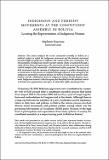| dc.contributor.author |
Stéphanie Rousseau |
| dc.coverage.spatial |
Canadá |
| dc.date.accessioned |
2016-01-07T15:21:35Z |
| dc.date.available |
2016-01-07T15:21:35Z |
| dc.identifier.uri |
http://desa1.cejamericas.org:8080/handle/2015/576 |
| dc.description.abstract |
Abstract: This article analyzes the recent constituent assembly in Bolivia as a political context in which the indigenous movement and the feminist movement presented different platforms to infl uence the content of the new constitution. The representation of indigenous women’s gender-specifi c claims is examined through a study of their forms of organizing at the intersection of both social movements and content analysis of the movements’ constitutional reform proposals. The success of both movements and the capacity of indigenous women to position themselves as a central actor in the process are explained through reference to the strength of the indigenous movement in national politics, the history of indigenous women’s mobilization, and the collaboration between indigenous women and the feminist movement. Indigenous women’s collective agency has benefi ted from this political context to develop new organizations and spaces to claim their rights and perspectives. |
| dc.language.iso |
English |
| dc.title |
INDIGENOUS AND FEMINIST MOVEMENTS AT THE CONSTITUENT ASSEMBLY I N BOLIVIA: Locating the Representati |
| dc.ceja.source |
Fuente: lasa-2.univ.pitt.edu |

